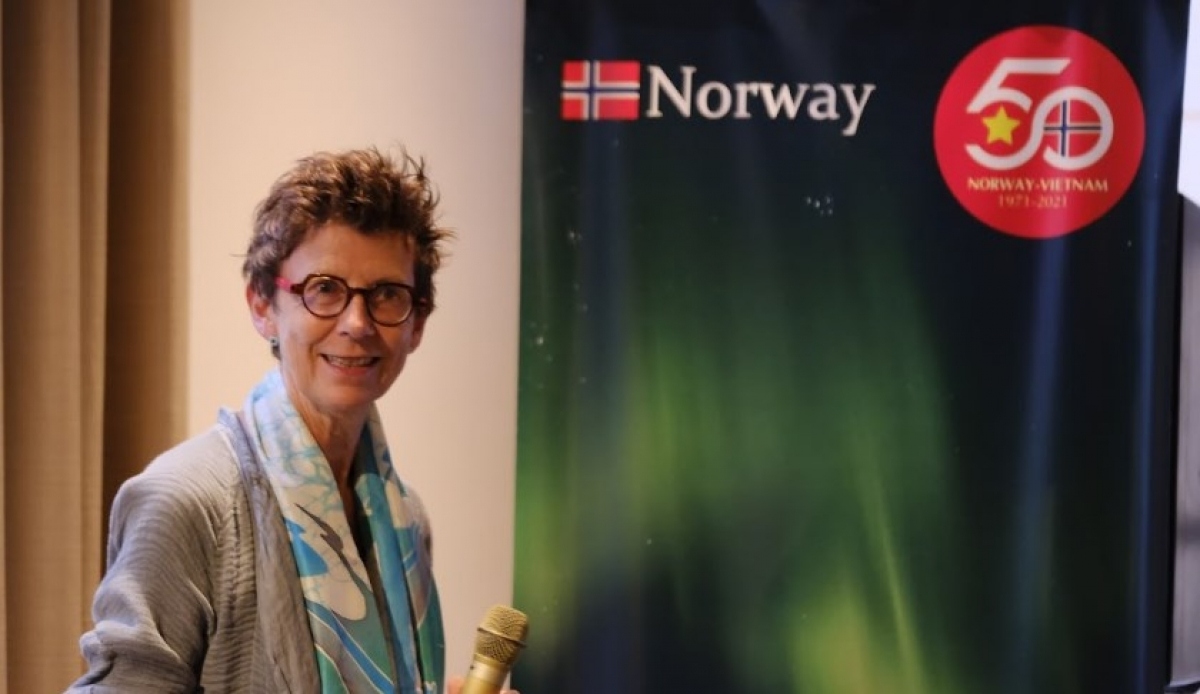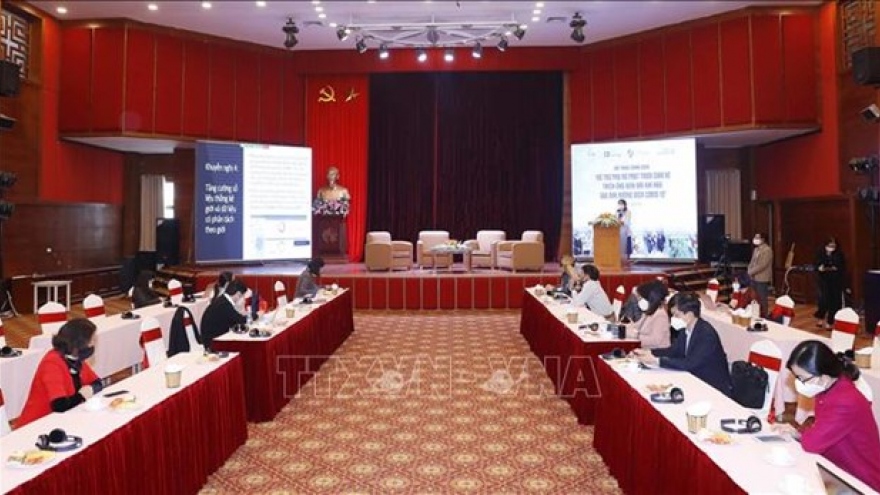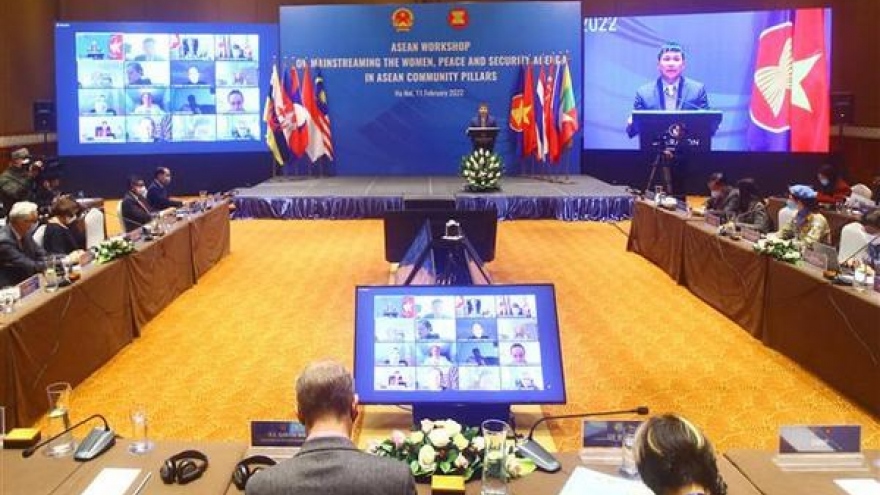International Women’s Day highlights importance of gender equality
VOV.VN - Norwegian Ambassador Grete Lochen has granted an media interview about raising awareness about the rights of girls and women and the importance of gender equality on the occasion of the International Women' Day (March 8).

Reporter: Ambassador, what do you think about the 8th of March? In the context of more and more people talking about gender equality, do you think we should have a dedicated day to honour women?
Thank you for the interview. I would first like to refer to an Action for Equality Quiz held by Norwegian Ministry of Foreign Affairs last year where people are asked 7 questions to test their knowledge about how the world is progressing towards the gender equality goals. One question was “How many countries (of the 129 studied) are on track to achieve Sustainable Development Goal number 5 on gender equality by 2030?” Do you know what the answer was? 0. This is sad, isn’t it?
Yes, the 2019 Global Goals Gender Index, published by the Equal Measures 2030 partnership, found that among the 129 countries studied, no country has fully achieved the promise of gender equality envisioned in the 2030 Agenda. The COVID-19-pandemic exacerbates existing inequalities for women and girls across every sphere – from health and the economy to security and social protection, including domestic violence. Consequently, it is even less likely that the Sustainable Development Goal #5 (achieve gender equality and empower all women and girls) will be achieved by 2030.
Therefore, we still indeed need an international day to celebrate women’s efforts and their achievements in historical, cultural, and political spheres. The International Women’s Day is to continue raising awareness about the rights of girls and women and the importance of gender equality if we want just and sustainable development. It is also a day of international solidarity with women all over the world; to highlight that women and children are often the main victims of wars and conflicts, including victims of sexual violence as a tool of war.
The active participation of women in any peace processes is therefore key if we want sustainable and lasting peace. I just need to mention Afghanistan for your readers to understand the importance of inclusive peace processes and the rights of women to education, health services, work as well as political participation.
Reporter: For the last 4 years, you must have been travelling to different parts of Vietnam. As a female Ambassador, how do you see the situation and the role of Vietnamese women?
It is a little bit unfortunate for me because I’ve had to spend two out of the 4 years in Vietnam with COVID-19, which indeed has tumbled everything. With lockdowns and travel restrictions, I could not travel much for the past two years. However, before that, I was able to visit some parts of Vietnam both professionally and privately and had a chance to interact with women across the country.
It is not difficult to notice the significant progress in the position of Vietnamese women. No one would deny Vietnam’s commendable achievements in terms of gender equality. Vietnam has taken great strides in advancing women’s roles and participation in different aspects of life. More than 70% of women participate in the labour workforce which is very high in the global context. However, we also know that the majority of workers in the informal sector are women and do not have the same access to social protection and benefits than in the formal sector. The pandemic has really highlighted this fact. We also see differences when it comes to opportunities between urban and rural women and especially women from ethnic minorities.
Today, many women own businesses and hold senior positions. Vietnam had its first female chair of the National Assembly. In your 2021 election, female members in the National Assembly make up 30.26%, which is a nearly 4% increase from the previous term and is good in the Asian context. This put Vietnam in the 60th place out of 187 countries worldwide in the IPU ranking of women in national parliaments. This is important.
Our experiences in Norway show that when more women entered politics in the 1970’s, we experienced a strong push in more family friendly legislation such as child care and parental leave. This has been key in promoting gender equality in practice and giving women more equal opportunities. Vietnamese women are very hard working. I do experience that they still have a lot of expectations and traditional values on their shoulders, being seen as having the main responsibility of raising children and taking care of the elderly in the family. It’s important to get men more involved and sharing responsibilities at home. Otherwise we will not succeed in gender equality.
Reporter: The pandemic has not only deepened the existing gender gaps but also created new forms of inequalities. What do you think we should focus our actions on to address this situation?
Indeed, COVID-19 is increasing multiple kinds of inequalities globally and Vietnam is not an exception. They include economic inequalities, with some of the biggest winners being those with high stakes in the technology sector and the losers being those who work in informal sectors. Economic inequality worsens gender inequalities as women, alongside the poor, elderly, disabled and migrant populations, have been hit hardest by the pandemic. Many of them work in the sectors that have been shut down due to Covid-19 including small shops, restaurants, and airlines etc. Economic inequalities have created a gap in accessing healthcare services.
When the health crisis hits entire segments of society, it is easier for one with better economic status to access hospital and other healthcare services. Meanwhile the pandemic has also deepened geographic inequality with people living in poor and rural areas being more vulnerable to the health and economic impacts of the pandemic than the urban ones. We also know that domestic violence has increased during the pandemic. This is a domino effect of the COVID-19.
Many studies of the UN and other INGOs show that across several social, economic, and political dimensions, women and girls are disproportionately affected by the crisis simply because of their sex. The immediate effects of COVID-19 on gender inequality are already showing themselves in health and education, on the burden of unpaid care work and gender-based violence. Never before, just and sustainable economic recovery will be crucial. We need inclusive and equitable policy responses which prioritize protection of the vulnerable groups including women and girls and which can ensure that support and relief packages reach all. Leave no one behind is more important than ever.
Reporter: “Women, peace and security” has been a global agenda for the last two decades. The international community has shown a strong commitment to implementing this WPS agenda. WPS has also been a priority for Norway and Vietnam as non-permanent member of UNSC. Frankly speaking, however, it is a long and challenging way to go and get there. What, in your opinion, should we do to protect the basic rights of women in the context of the regional and global security environment getting more complicated?
Yes, you are right. War and conflict affect men, boys, women and girls differently. In order to establish sustainable and lasting peace, it is crucial to include women in all peace efforts. That is why UNSC adopted the landmark Resolution 1325 in 2000, which affirms that peace and security efforts are more sustainable when women are equal partners in the prevention of violent conflict, the delivery of relief and recovery efforts and in the forging of lasting peace.
Norway advocates consistently for a more gender-balanced participation in peace- and security efforts. In any peace processes where Norway is engaged, we have worked systematically over many years to promote women’s rights and participation. We believe, to end conflict and to work effectively towards peace, women must be an active part of the process. Women and girls are not just victims of war. Women bring different perspectives and experiences to the table. They represent 50% of the population. Excluding them from any peace efforts is not the right thing to do but it’s also not the smart thing to do if we want lasting peace. This is the Norwegian experiences after having taking part in several peace processes whether it’s in Colombia, the Middle East, Afghanistan or Sri Lanka.
However, women peace builders and human rights defenders are always at risk both to violence and even target killings not only for what they say, but for who they are, because of just being women. Therefore, we have to bring this very serious issue to the UNSC. The work of women peace builders and human rights defenders must be recognized and that their safety and security are protected.
Reporter: Speaking of UNSC, how did you see Vietnam’s performance at this UN body and also what can you say about Norway’s Presidency at the Council in January this year?
Norway worked with Viet Nam in the UNSC for one year (2021). We appreciated our dialogue and cooperation with Vietnam in the Council. Viet Nam has shown its proactive role in addressing various important issues, including women, peace and security; mine action; and protection of civilians and civilian infrastructure as well as enhancing the role of regional organizations such as ASEAN in regional peace and security efforts. You have collaborated well with other members of the Council in the search for constructive and balanced solutions as well as in reaching broad consensus on resolutions and statements from the UNSC.
Norway and Vietnam shared more or less the same thematic priorities in the Security Council, including women, peace and security. Vietnam left the Council at the end of last year but let me assure you that Norway will continue this year highlighting our thematic priorities in our work in the Council.
In January this year Norway held the rotating Presidency of the Security Council. To address two of Norway’s priorities including women, peace and security and the protection of civilians in conflicts, Norway conducted two signature events including a session in January addressing violence that targets women peacebuilders and human-rights defenders; and another one on “war in cities: protection of civilians in urban settings”.
We are proud and honour to have held the Presidency January successfully. Once again, WPS agenda has been promoted strongly by Norway as we have also prioritized to invite female representatives from the civil society to brief the Council. To reach sustainable and lasting peace, we need a dialogue with all stakeholders.
Reporter: Do you have any messages to the Vietnamese women on this day?
Be proud of yourselves. Vietnamese women are strong and inspirational. We still need to fight for equal rights and get men and boys more involved in this process. Happy International Women’s day! Happy 8th of March.
Reporter: Thank you, Ambassador.


